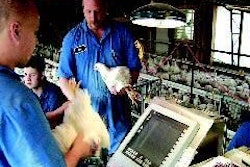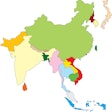During a week of unseemly squabble at WHO in Geneva over human pandemic H5N1 vaccines that do not even exist, it took World Organisation for Animal Health (OIE) to bring H5N1 control firmly back down to ground level. Preventing spread of H5N1 among poultry is the best way to keep this dangerous virus from infecting people said OIE director general Bernard Vallat. He also made valid points about notably fewer deaths in wild (including migratory) birds during 2007 which “could indicate the disease is coming closer to the end of a cycle”. In spite of poultry outbreaks in some countries and endemic infections in at least three (Indonesia, Egypt and Nigeria) most nations had been able to suppress the disease in poultry, said Vallat.
His comments prompted over-optimistic headlines like ‘Is bird flu beaten?’ and in accordance with Murphy’s (Sod’s) Law* H5N1 promptly embarked on an orgy of resurgence.
Vietnam recorded its first human case since November 2005 and Indonesia announced its 77th death, a 5-year old girl from Central Java. Vietnam’s human case was accompanied by a wave of poultry outbreaks in at least five northern, central and southern provinces leading a FAO official to suggest the disease was more or less endemic in Vietnam.
FAO described the situation in Bangladesh as very serious and requiring long term strategic control. What sounded like a potentially serious outbreak in China’s central Hunan province with almost 60,000 birds dying or destroyed was mentioned by the government of PRC. An outbreak on three farms near Islamabad in Pakistan resulted in 3,000 birds dying and another 10,000 birds being culled, several months after the previous outbreak of disease. The most recent outbreak in Ghana, West Africa moved from the port city of Tema into central Brong Ahafo region, hub of the country’s poultry industry.
Comments from some governments when they announce outbreaks in poultry underline Bernard Vallat’s point that insufficient importance and consideration is given to these infections. China and Pakistan accompanied their announcements with the obligatory and by inference downgrading qualification “there are no accompanying human infections”.
Indonesia’s report of its 97th human case (77th death) was accompanied by the usual vague reference to sick or dying fowls, an official saying at least 20 chickens had died suddenly near the girl’s home. Indonesia and Nigeria appear to have ‘given up’ on poultry infections. Egypt is essentially ring-fencing its commercial sector and cities while adopting a ‘hands-off’ approach to infection amongst backyard poultry in rural areas. These are the three countries where H5N1 is endemic and where development of a human pandemic strain is most likely.
* “What can wrong, will go wrong” is the essence of Murphy’s Law (North America), traditionally called Sod’s Law in the United Kingdom.



















